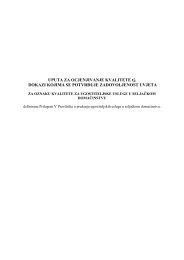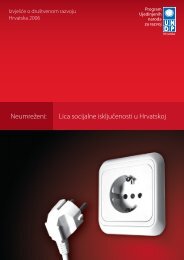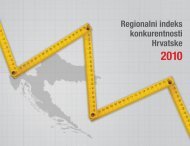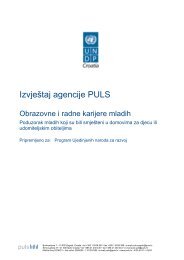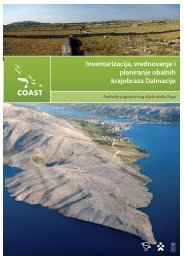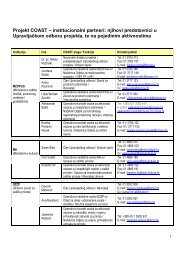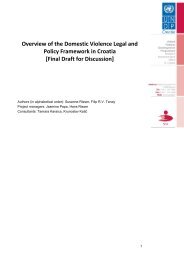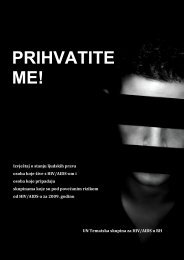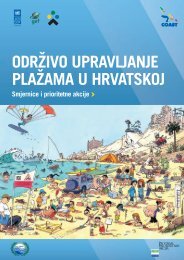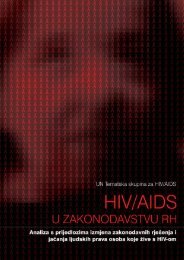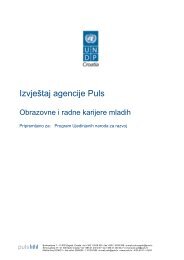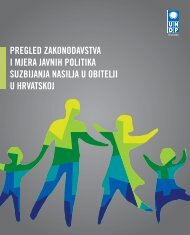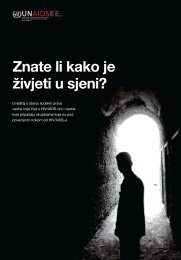WEB engleska verzija end.indd - UNDP Croatia
WEB engleska verzija end.indd - UNDP Croatia
WEB engleska verzija end.indd - UNDP Croatia
- No tags were found...
You also want an ePaper? Increase the reach of your titles
YUMPU automatically turns print PDFs into web optimized ePapers that Google loves.
THE SOCIALLY EXCLUDEDCHAPTER 3Institutionalised people with intellectual disabilitiesare prevented from making decisions concerningtheir life and from making personal choices. In aresidential institution, the possibility of interactionwith the natural social environment is limited, ornon-existent (social exclusion). Individuals withintellectual disabilities form a group of people mostcommonly deprived of their legal capacity - one ofthe main preconditions for most citizen rights. Theseindividuals lose a number of guaranteed rights, suchas the right to paid employment, the right to marryand to have a family, the right to vote, the right offree association, the right to choose one’s place ofresidence, access to education, etc. These rights areinvoked and negotiated by legal guardians on behalfof the disabled individual.According to the Ministry of Health and Social Welfare,as of December 31, 2004, 13,875 adults wereplaced under guardianship, of which 6,806 had anintellectual disability; 4,148 had been placed intosocial welfare homes (residential institutions) by theirguardians. Most people with intellectual disabilitieslive in the community with the support of familymembers, but they have very limited opportunitiesto be included in the activities offered by their localcommunities. This is mainly due to the absence ofprofessional support services in their local communities.If a person with intellectual disabilities remainsalone, without a next of kin, they t<strong>end</strong> to be placedin one of the residential institutions, implying formany a lifelong separation from the surroundingswith which they identify. Experiences of people withintellectual disabilities “clearly point to the fact thatpeople in institutions do not have any rights.” 753.4.2 Access to Social ServicesSpecial care to individuals with intellectual disabilitiesis provided through the system of social welfare,which is meant to provide assistance in fulfilling thebasic needs of the socially vulnerable which theycannot satisfy on their own or with the help of theirfamily members, due to personal, economic, social andother circumstances. Dep<strong>end</strong>ing on the source of socialinsecurity, beneficiaries of social welfare could be interalia “a physically or mentally disabled or ill adult person,an elderly person, an infirm person or any other personwho in view of permanent or temporary changes totheir health cannot meet their basic living needs.” TheCentre for Social Welfare, established in the territory ofthe person’s residence, is responsible for the provision ofsocial services. A person may, within the welfare system,exercise one of a dozen of rights, such as: counselling,assistance in overcoming special difficulties, support assistance,residential expenses assistance, one-time supportbenefit, home care and assistance allowance, homecare and assistance, disability assistance, indep<strong>end</strong>entliving and occupational training, provision of care outsidethe family, as well as other forms of assistance (foodassistance, clothing and footwear assistance, assistancefor personal needs of clients in residential care, paymentof funeral expenses, energy assistance).The financial rights within the social welfare systemare determined on the basis of the minimum personalamount (set at 400 HRK) necessary to realise basic socialwelfare rights, as prescribed by the Government of theRepublic of <strong>Croatia</strong>. An addition, the assistance and carefor one individual may be calculated at 70% of the base(280 HRK), while the maximum amount that could begranted for personal disability compensation is 250% ofthe base (1,000 HRK). The amount the person receivesdep<strong>end</strong>s on the income of the members of the family.Social welfare rights which are supported by fundingare minimal, and the established base for funding hasnot changed despite the increase in the cost of living.<strong>UNDP</strong> focus groups indicated that respondents considerthe social welfare system to be poorly organised,and one in which the realisation of rights dep<strong>end</strong>s onone person – most frequently a social worker. Theemployees at the CSW are satisfied with their ownwork and that of their institutions, although they arenot convinced of the satisfaction of their clients. 7775 <strong>UNDP</strong>, 2006b76 Social Welfare Act, OG 73/97, 27/01, 59/01, 82/01, 103/03, 44/0677 <strong>UNDP</strong> (2006c). Reserach in Social exclusion in <strong>Croatia</strong>: providers of social welfare services. <strong>UNDP</strong>, Zagreb, <strong>Croatia</strong>.61



